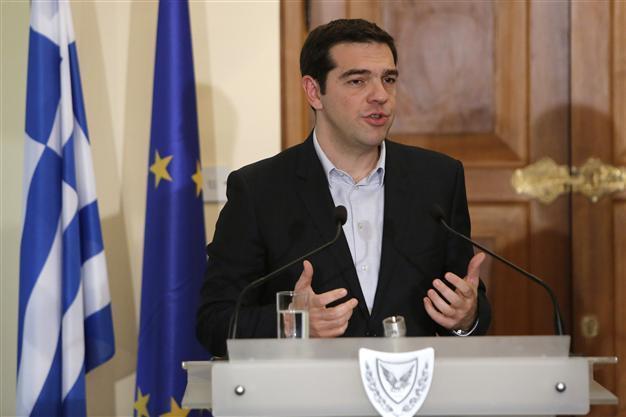Greek leaders head to Rome on Europe tour to urge debt deal
LONDON - Agence France-Presse

Greek Prime Minister Alexis Tsipras speaks to the media during a press conference after meeting with Cyprus' president Nicos Anastasiades Feb. 2, 2015. AP Photo.
Greece's radical new leaders hope to win Rome's support at talks on Feb. 3 in their bid to renegotiate a massive 240-billion-euro ($270 billion) bailout following encouraging remarks from Prime Minister Matteo Renzi who said Europe must abandon austerity.Leftist Prime Minister Alexis Tsipras, who swept to power a week ago pledging to end painful austerity measures demanded by the EU and the International Monetary Fund, has vowed to find a debt agreement for "all the peoples of Europe" as he seeks backing for Athens' position.
He and Finance Minister Yanis Varoufakis are touring Europe this week to build support for a renegotiation of the huge bailout, over strong opposition from Germany.
Varoufakis is to hold talks in Rome with his Italian counterpart Pier Carlo Padoan on Tuesday morning while Tsipras will travel from Cyprus to meet with Renzi in the afternoon.
They are likely to take heart from remarks by Renzi, who Monday reiterated his long-standing view that Europe must abandon austerity, while calling for "prudence and responsibility" in the handling of the Greek situation.
"I believe it is crucial to send a clear message: we want to move the discussion on economic policy from austerity and rigour towards growth and investment," Renzi said on RTL Radio.
"We have to change economic policy at the European level, not just for Greece or any other country." Following talks with Varoufakis in London on Monday, British finance minister George Osborne warned: "It's clear that the standoff between Greece and the eurozone is fast becoming the biggest risk to the global economy."
Varoufakis told the Financial Times that he would not ask for Greek debt to be written off, but rather for a series of debt swaps he described as "smart debt engineering", while cracking down on wealthy tax evaders.
"The only thing we shall not retreat from is our view that the current unenforceable programme needs to be rethought from scratch," he told the newspaper.
Despite a restructuring in 2012, Greece is still lumbered with debts of more than 315 billion euros, upwards of 175 percent of gross domestic product, an EU record. Greece would need to dedicate its entire annual wealth for two years to repay the amount.
An academic and popular blogger, Varoufakis also held talks with City of London bankers hosted by US giant Merrill Lynch, with a Greek government source saying he wanted to encourage investment and reassure bondholders.
The new Greek administration, which has hired investment bank Lazard to advise it on how to manage its debt, was boosted by comments from US President Barack Obama on Sunday, who warned against "squeezing" Greece.
Tsipras has dismissed the "troika" system monitoring Greece's economy -- the International Monetary Fund, European Commission and European Central Bank" -- as lacking legal status, and blames Germany for driving the tough austerity programmes his hard-left government has pledged to end.
German Chancellor Angela Merkel has ruled out debt relief and on Monday said "tough talks" lay ahead.
A top European Central Bank official piled on further pressure last week, warning that the bank could not keep lending to Greece unless an agreement is found before a February deadline.
"Europeanists should not be toying with the solidity of the eurozone. We should be settling uncertainties, we should be settling nerves," Varoufakis told Britain's Channel 4 News.
"There will be a deal that in a very short space of time is going to make it perfectly clear to everyone that Greece can play within the rules, and in a way that puts the Greek crisis away, once and for all."
The Finnish Finance Minister Alexander Stubb said on Monday that Greece's loan repayment period could be extended, while the governor of the Bank of France ruled out cancelling debt but said some "accommodation" could be found.
European stock markets closed higher on Monday after a volatile week of trading since the Greek election.
The benchmark index in Athens rose by 3.7 percent after Merkel said Berlin wanted "friendly relations" with Greece and invited Tsipras as a "welcome guest".
Syriza's stunning election success and the formation of a coalition government with the nationalist Independent Greeks has sent shockwaves through Europe.
In its first week in power, the government scrapped the privatisation of Greece's two main ports and the state power company and announced a major increase in the minimum wage.
But Tsipras has tried to calm nerves by saying he did not intend to renege on commitments to the EU and IMF.
"It has never been our intention to act unilaterally on Greek debt," he said in a statement to Bloomberg News.
He heads to Brussels Wednesday for talks with European Commission President Jean-Claude Juncker.
















